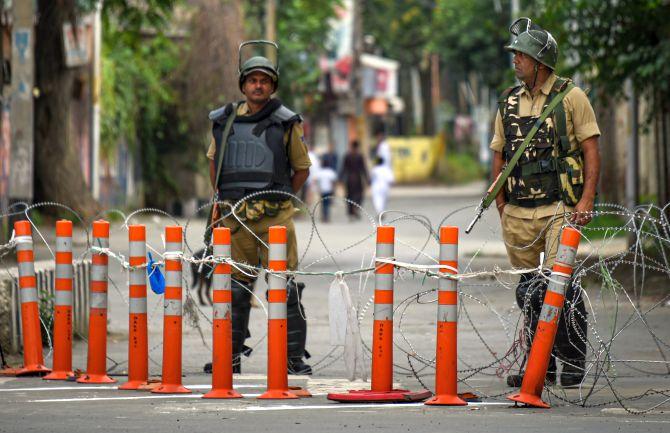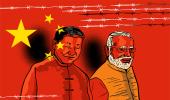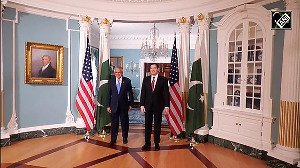'China's bona fides in moving the UNSC are suspect and based on protecting its gobbled-up Kashmir territories.
'It is not clear whether China's current move will be extended to its logical conclusion -- that of moving a new UNSC resolution on Kashmir.
'India needs to closely monitor the discussions at the UNSC and make counter-measures as this touches its core interests', points out Srikanth Kondapalli.

In a significant escalation in relations with India, China had asked for "closed door consultations" at the United Nations Security Council on the Kashmir issue at the behest of its "all weather strategic partner" Pakistan even though the chair of the council, Polish ambassador Joanna Wronecka, rejected the move initially suggesting that this issue has to be resolved at the bilateral level.
This is despite the assurances of visiting foreign minister S Jaishankar's that the revocation of the temporary Article 370 and reorganisation of Jammu and Kashmir state does not involve any "extra territorial claims" nor a change in status quo on the Line of Control with Pakistan or the Line of Actual Control with China.
Earlier, Foreign Secretary Vijay Gokhale briefed China's ambassador, along with the other P5 ambassadors, on the Indian Parliament's action in this regard.
China clearly is following what it had stated when Pakistan foreign minister Qureshi visited Beijing on August 9.
Wang stated: "The Kashmir issue is a dispute left from the colonial history. It should be properly and peacefully resolved based on the UN Charter, relevant UN Security Council resolutions and bilateral agreement".
While any discussion behind closed doors at the UNSC will be to first see whether the China-Pakistan query on Kashmir has any merit for further discussions, the Kashmir issue was discussed last time at the UN in 1998 when China, backed by the United States, passed the 1172 resolution criticising the nuclear tests.
Earlier, it came up during the Bangladesh Liberation War in 1971 and in 1948 in resolution number 47.
In 1948, the People's Republic of China was not yet formed and the Republic of China (shifted to Taiwan in 1949) was a party to the resolution.
The April 21, 1948, UNSC resolution had put a caveat before any plebiscite in the valley -- "To secure the withdrawal from the state of Jammu and Kashmir of tribesmen and Pakistani nationals not normally resident therein who have entered the state for the purposes of fighting, and to prevent any intrusion into the state of such elements and any furnishing of material aid to those fighting in the state".
Pakistan never withdrew these intruders into Kashmir and on the top of it has been occupying major portions of Kashmir -- some of which (about 19,000 square kilometres) it transferred to China.
Thus, China's bona fides in moving the UNSC are suspect and based on protecting its gobbled-up Kashmir territories.
It is not clear whether China's current move will be extended to its logical conclusion -- that of moving a new UNSC resolution on Kashmir.
India needs to closely monitor the discussions at the UNSC and make counter-measures as this touches its core interests.
It also needs to assess China's overall position and support for India in the United Nations which has been either negative or incremental in nature.
Firstly, in terms of China exercising veto power, China's position has been negative towards India.
When China joined the UN in 1971, partly and ironically with the Indian consistent support since the 1940s, it used the veto to shoot down the application of membership of the newly formed Bangladesh in a resolution at the UNSC on August 25, 1972.
However, recently, India supported the January 12, 2007, measures of China and Russia vetoing the US proposal on Myanmar.
India was well coordinated with China in the Russia-India-China format or in BRICS and at the UN on Syria, Iraq and other contentious issues.
Secondly, while all the rest of the P5 members explicitly supported India's candidature for a permanent member at the reorganised UNSC, China has been lukewarm to such support.
At the Yekaterinburg meeting of the BRIC in 2009 China (and Russia) stated that they are "supporting the aspirations of India to play a bigger role in international affairs, including in the United Nations", a position -- which is here and nowhere when it comes to the UNSC permanent membership -- remained constant for over a decade now, indicating to no progress on this stale formulation.
While the same phrase has been applied to South Africa and Brazil, China is reluctant to support explicitly anyone in the reorganised UNSC.
Thirdly, as mentioned above, China came heavily down on Indian nuclear tests when it supported the US sponsored resolution 1172 at the UNSC on "cap, roll-back and eliminate" the nuclear potential.
Ironically, China supplied lock, stock and barrel nuclear weapons technologies, materials, delivery systems and others to Pakistan and violated all provisions of the arms control and disarmament of the UN.
Fourthly, despite the overwhelming support of the international community and the US, UK, France and Russia at the 1267 counter-terrorism committee, China had vetoed such proposals to shield globally designated terrorists such as Zakir-ul Rahman, Masood Azhar and others involved in cross-border terror incidents in Kashmir.
Recently, China relented at the committee mainly because of its perceived international isolation once the US planned to move the issue in the UN formally.
On another related subject, China has been blocking Indian membership in the Nuclear Supplies Group unless and until Pakistan is given membership in this group.
China's current gamble at the UNSC is clearly a setback to relations with India.
Both have articulated since the late 1990s about building a "just and fair" international multi-polar order and have pursued this in multilateral institutions such as the UN, BRICS, SCO and others.
China's current move at the UNSC scuttles any such cooperation in the future.
China's move is expected to strain bilateral relations, specifically in the economic field where China has been eyeing the 400 million consumers in India.
Srikanth Kondapalli is Professor in Chinese Studies at Jawaharlal Nehru University.











